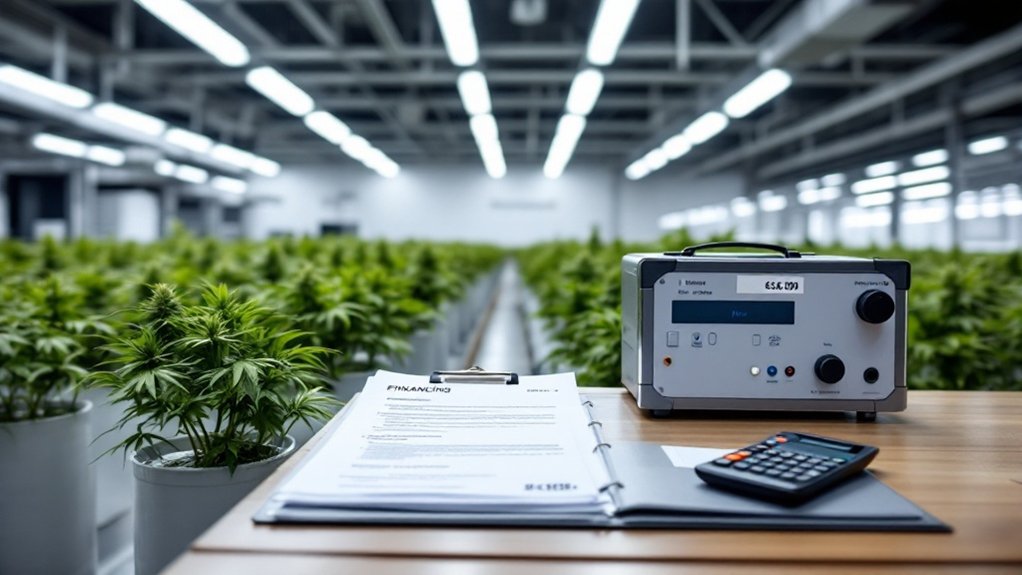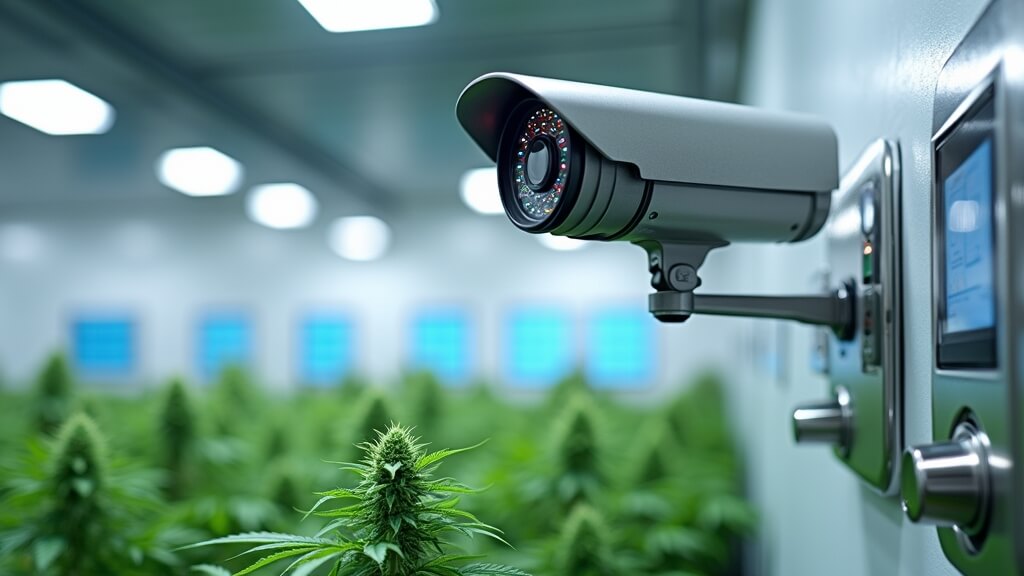Cannabis tech startups are revolutionizing the industry through multiple innovations. Cultivation technology, projected to hold 28.6% market share by 2025, employs AI and IoT sensors to optimize plant growth. Supply chain solutions enhance transparency while reducing operational costs through automation. E-commerce platforms and personalization algorithms are transforming consumer experiences, with digital sales expected to increase 300% by 2025. Meanwhile, specialized compliance tools using blockchain guarantee regulatory adherence as the sector expands toward a projected $25.41 billion valuation by 2032.

The burgeoning field of cannabis technology startups represents one of the most dynamic sectors in today’s innovation landscape. With projections indicating growth from $5.15 billion in 2025 to an impressive $25.41 billion by 2032, these companies are capitalizing on a compound annual growth rate of 25.6%. This remarkable expansion is occurring within a broader cannabis industry expected to reach nearly $45 billion in 2025 in the United States alone. Increasing recognition of cannabis’s health benefits, combined with regulatory relaxation globally, has positioned this sector as particularly attractive to investors seeking scalable, innovative opportunities.
Cultivation technology commands a substantial portion of this market, with an estimated 28.6% share in 2025. Advanced systems incorporating artificial intelligence and Internet of Things sensors now enable precise environmental monitoring and automated control of growing conditions. These technological innovations optimize plant growth through real-time tracking of soil composition, humidity levels, and light exposure, while controlled environment agriculture enhances the ability to grow high-quality cannabis year-round.
Industrial and small-scale cultivators alike benefit from automated fertigation systems and specialized LED lighting that enhance efficiency while improving both yield quantity and quality.
Supply chain optimization represents another critical focus area for cannabis technology companies. Startups have developed sophisticated tracking systems that improve transparency throughout distribution channels while ensuring regulatory compliance. Automation in packaging and shipping processes reduces operational costs while simultaneously increasing efficiency.
Supply chain innovations drive cannabis industry transformation through enhanced transparency, compliance automation, and operational efficiencies.
Real-time inventory management solutions minimize product shortages and prevent overstocking, addressing common industry pain points and enhancing overall operational stability.
Consumer-facing innovations are similarly transforming the cannabis retail experience. User-friendly e-commerce platforms and delivery systems simplify product access, while technology-driven personalization algorithms tailor recommendations to individual preferences. With millennials accounting for 46.2% of spending in the U.S. cannabis market, these digital innovations are strategically targeting the industry’s most valuable demographic segment. Online cannabis platforms are experiencing unprecedented growth with projections showing 300% increase in digital sales by 2025.
Mobile applications now offer secure ordering, delivery tracking, and educational content, with AI-powered chatbots enhancing customer support. These advancements are complemented by seamless payment integration solutions that reduce transaction friction.
The industry’s complex regulatory environment has spurred development of specialized compliance tools that automate monitoring of labeling, testing, and reporting requirements. Blockchain technology enables thorough seed-to-sale tracking, while digital age verification systems enhance safety protocols.
Data analytics platforms now identify potential quality issues in real time, further bolstering consumer protection. As global legalization efforts progress and cross-industry partnerships emerge between cannabis and traditional technology sectors, these innovations continue to accelerate, fundamentally reshaping how cannabis businesses operate across the entire value chain.
Frequently Asked Questions
How Do Cannabis Regulations Vary Across Different States?
Cannabis regulations across states form a complex patchwork of legal frameworks.
Twenty-four states have legalized recreational use, while 39 permit medical cannabis with varying qualifying conditions.
Restrictions differ dramatically, from Iowa’s six-month jail sentences for simple possession to fully legal retail markets in states like Colorado.
Product restrictions also vary considerably; Kentucky caps THC content at 35% for flower and 70% for concentrates.
Federal prohibition continues to complicate compliance for businesses operating across state lines.
What Certifications Do Cannabis Tech Professionals Need?
Cannabis tech professionals typically require several industry-specific certifications depending on their specialization.
Cultivation Technician Certificates demonstrate proficiency in growing operations, requiring completion of 13 modules and a 70% passing score.
Risk management specialists pursue the Certified Commercial Cannabis Expert (CCCE) certification, which requires an 80% examination score.
Dispensary professionals often obtain the Certified Cannabis Budtender (CCBT) credential.
All certifications require ongoing education credits and membership in good standing to maintain validity, with digital badges providing third-party verification.
What Investment Opportunities Exist in Cannabis Tech?
Investment opportunities in cannabis tech span several categories, including venture capital funding for ancillary service startups like logistics software and compliance platforms.
Crowdfunding platforms enable smaller investors to participate in early-stage companies.
Lab testing software, supply chain management, and automation technologies attract significant capital due to their lower regulatory risk.
Investors typically favor technology-driven businesses that don’t touch the plant directly, particularly those with scalable models that could expand beyond cannabis into other regulated markets.
How Are Payment Solutions Evolving for Cannabis Businesses?
Cannabis payment solutions are evolving beyond cash-only models through multiple technological innovations. ACH transfers, mobile applications linked directly to bank accounts, and blockchain-based solutions circumvent traditional banking restrictions while maintaining compliance.
AI-powered fraud detection systems and integrated POS platforms enable more secure transactions in this challenging regulatory environment. Simultaneously, specialized digital wallets and preloaded payment methods utilizing state money transmitter licenses offer customers convenient alternatives.
These technologies are developing against a backdrop of potentially transformative federal legislation like the SAFE Banking Act.
How Can Traditional Businesses Transition Into Cannabis Tech?
Traditional businesses can shift into cannabis tech by leveraging their existing expertise in software development, payment processing, or supply chain management.
Companies should conduct thorough market research, identify specific industry pain points, and develop compliant solutions that address regulatory challenges.
Strategic partnerships with established cannabis businesses can provide valuable industry insights.
Non-plant-touching tech ventures typically face fewer regulatory hurdles, making them an attractive entry point for businesses with transferable skills in data analytics, e-commerce platforms, or inventory management systems.
This article provides general educational information about cannabis compliance requirements. Specific regulations vary by state and change frequently. Always consult with legal counsel and compliance professionals for guidance on your specific situation and jurisdiction. For more information, check out our Cannabis Compliance Guide.








